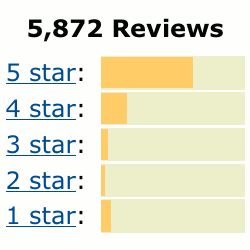When you purchase through links on our site, we may earn an affiliate commission (details)
Should You Display Customer Reviews of Your Product?
by Antone Roundy | 1 Comment | Marketing

Amazon.com is running an ad on TV where they brag about all their innovations. And they deserve to brag. Heck, I'll brag for them. My dad bought me a Kindle for Christmas nearly two years ago, and it's the one present I've used every single day since getting it. Awesome innovation.
Another thing they brag about on the ad is online product reviews. I'm not so sure they were the first to offer them, but Amazon's reviews have certainly had a huge impact on the retail world. How many times have you checked reviews on Amazon before buying a product, even if you bought it somewhere else? I know I've done that many times.
Earlier this month, Daryl Perry wrote:
Today, 72% of people trust online reviews as much as word of mouth. That's huge!!
...the guy with a subpar product and a lot of positive reviews will trump you online.
Here's a little food for thought: we all know that reviews are powerful. We read the 5-star and 1-star reviews and try to figure out if the people giving 1-star reviews are just dopes who don't know how to use the product, or if the people giving 5-stars are just company fanboys who don't care that the product broken the first time they turned it on.
My question is...
Do we trust testimonials as much as we do reviews?
What's the difference? Basically, testimonials are all the 5-star reviews, hand selected by the vendor to show up on the sales page. If we can't see the 1-star complaints, do we trust the testimonials?
We may read them and take them with a grain of salt. But if we don't know how many complaints there are per testimonial, it's a lot harder to know how much to trust them.
Which leads to my next question...
Should you post all reviews, or just the testimonials?
Posting everything can be scary! After all, to paraphrase the old saying, you can't please all the people all the time. What if you get too many complaints? What if the complaints come across sounding more credible? What if my product is flawed, and the complaints are more credible? Ouch!
Well, no risk. No reward. If we want people to believe the testimonials, maybe we need to post the complaints too. I think I've heard this suggested before...and I'm thinking I might start doing it.
As for the risk of getting too many complaints -- if you do, you can always go back to posting just the testimonials!
But there may be an even better strategy -- fix the problems, and publicly thank the complainers for the feedback that helped you make your product more awesome. Then you get credible testimonials, proof that you're responsive to customer needs, and you nullify the effect of the complaints (any that you can fix, at least) by fixing the problem that caused them in the first place.
Daryl gives some tips about how to proactively ask for reviews and testimonials. I have to confess to having thought of this many times, and not having gotten around to it. Thanks for the reminder, Daryl.





October 16th, 2014 at 9:12 pm
I run a review site myself and I can attest that product reviews make a world of difference when it comes to sales conversions. Whether people actually believe them or not, I don't know, but I can say that they have made a huge difference in my business. Like you said in the beginning of the article, I tend to look at the 1 star and 5 star reviews more critically than the others for the exact reasons you mentioned. I am surprised sometimes at how some people love to leave low reviews simply because THEY don't know what they are doing!!